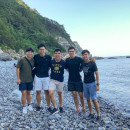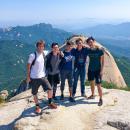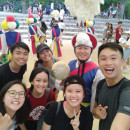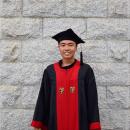1 School, 2 Months, Infinite Memories!! Past Review
By Loh Sheng Xiang (National University of Singapore / NUS) - abroad from 06/26/2018 to 08/02/2018 with
Korea University: Seoul - International Summer Campus
I went to Korea alone, with much apprehension, and not knowing if I would enjoy my time there. Now that I've gone through it, I thought, why did I even worry? KUISC was without a doubt, one of the BEST things I've done throughout my life as a University Student, or perhaps even my entire life!! Taking a leap of faith to join this program, I've learnt to embrace new experiences in a foreign environment, and being apart from family, I've grown to be more independent and open to making new friends. Looking back at the photos and videos I've taken throughout the trip, I really miss the country and am looking forward to my next trip to Korea. And I will definitely visit KU again when I'm there! KUISC provided us with lots of great programs that I really enjoyed. They brought me to my first baseball game. Never would I expect that I would cheer so hard for a team that I knew nothing about, playing a sport that I had never played. And having the opportunity to have Kpop stars surprising the students at a "seminar talk"! Who wouldn't want to experience that?? To all potential KUISC students who are deciding whether to embark on this amazing journey, just do it. You will not regret it!
Review Photos





Personal Information
| How much international exposure did you have prior to this program? | None |
Review Your Program
|
* Overall educational experience
Academic rigor, intensity, resources, etc. |
Intensity is just right with 100 minute lessons for the 6 week program. Lecturers were knowledgeable in their own fields and dedicated to ensure students take away something from their classes at the end of the short program. |
|
* Host Country Program Administration
On-site administration of your program |
Host country came to my university for talks and had a separate briefing session for those who have accepted Korea University's offer. They also offer free shuttle bus services from the airport on certain dates and any updates of events and activities were made known to us via email or kakaochat which is very convenient for us! |
|
* Housing:
How satisfied were you with your living arrangements? |
I stayed in an off-campus apartment called goshiwons. It is a small room with a personal toilet, a bed and a study desk. It was cozy and also a slightly cheaper alternative to the on-campus rooms. There are a lot of goshiwons near anam station and they happen to be near Woodang hall which is where summer classes will be, so I definitely recommend it if you enjoy a bit of privacy convenience. Some owners of the apartments speak only simple English so they'll probably google translate some of your emails if you have any questions for them so do take note. |
| * Food: |
2 on-campus canteens that are near to the classrooms. Its at the building adjacent to Woodang hall where classes are at. There is a canteen at the basement which has buffet-style food which changes cuisines everyday. Costs 5000 won. And there is a cafe on the second floor which is like a normal restaurant, but prices are around 4000 won and above. Menu changes everyday as well. But I do recommend going out of school along Anam street to eat as there are really a lot of food options there. There are many good restaurants tucked away at a corner so do search for them! There is a really good stall called Mr Pork Cutlet at a tiny alley which sells really good and juicy cheese-filled pork cutlet! |
|
* Social & Cultural Integration:
How integrated did you feel with the local culture? |
The school gives you ample opportunities to experience Korean culture through activities and field trips and I recommend going to ALL of them if possible! These activities range from Taekwondo and Ice skating lessons to field trips out of Seoul like the Boryeong Mud Festival and Korean cultural village. Do take this opportunities to make friends with other students as these activities will be fun if you experience it as a group! Do talk to the locals too as they are really friendly! |
|
* Health Care:
How well were health issues addressed during the program? |
No health issues experienced through out the program. The staff at KU will brief students on what to do in case of illnesses. Also, NUS covers health insurance for NUS students so do look up on that and apply. |
| * Safety: |
Very safe place but I do recommend not staying out too late at night as Koreans do tend to drink a lot and you may encounter some drunk people on the streets at night. |
| If you could do it all over again would you choose the same program? |
Yes
KU was nothing short of amazing. There are so many programs to experience there and looking back, I really did enjoy all of the programs! There are many more things I would like to try in Korea but did not do so. Having an opportunity to go back again, I would definitely be more proactive in exploring the country! |
Finances
|
* Money: How easily were you able to live on a student's budget?
(1 = not very easy/$200+ on food & personal expenses/week, 2.5 = $100/week, 5 = very easily/minimal cost) |
Manageable budget if you go out after school with not much big expenses. Korean food is generally not cheap as a meal in a simple restaurant costs ~8000 won. I generally spend 1000 won on a simple onigiri from the convenience stall for breakfast and about 6000 won for lunch and dinner each. I do regret not spending a bit more to try more food in Korea as there is really a lot of good food there. |
| Not including program expenses, about how much money did you spend on food and other expenses each week? | Average about 130,000 - 150,000 won per week |
| Do you have any general money-saving tips for future study abroad participants? | I recommend staying at a goshiwon as it is cheaper than the on-campus accommodations. Prepare extra home currencies in-case you over budget, which is not rare. Travelling on trains and buses takes up A LOT of your budget so do pick an accommodation near to the school. But nonetheless, don't scrimp on good things that you might not get to do/eat in the future. Do take this opportunity to enjoy the trip and not let budget hinder you too much :) |
Language
| * Did your program have a foreign language component? | No |
Direct Enrollment/Exchange
| * Did you study abroad through an exchange program or did you directly enroll in the foreign university? | Exchange |
Other Program Information
|
* Where did you live?
Select all that apply |
|
|
* Who did you live with?
Select all that apply |
|
|
* Who did you take classes with?
Select all that apply |
|
A Look Back
| * What did you like most about the program? |
|
| * What could be improved? |
|
| * What do you know now that you wish you knew before going on this program? | I wish I knew how much I would enjoy my time there and I would have extended my stay!! Before the trip, I could speak a little Korean so I could make very simple conversations with the locals. Despite that, I would preferred to have taken at least Level 2 Korean lessons so that I could really have better conversations with them as they were really kind and I would have wanted to converse with them further but was unable to. Also, I would have packed a bigger luggage knowing how many snacks I would buy! |
Individual Course Reviews
| Course Name/Rating: |
Operations Research in Practice |
| Course Department: | |
| Instructor: | Dario Landa-Silva |
| Instruction Language: | English |
| Comments: | Engaging and funny lecturer who makes a point to remember everyone's names.Knowledgeable in his own field and explanations are simple. Content-wise, quite simple with his lecture notes. This module has more application involved as we use Excel and LPSolve to solve linear problems applied to real-life situations. Very interesting if you have not done something like this on Excel. There are no exams but there will be an online quiz done in class every week, and at the last week there is a group project to be done. Also, there is a take home assignment every week as well. Manageable in general but some problems take a bit more work. Recommend to make friends in class to discuss some of the assignment questions. |
| Credit Transfer Issues: | Managed to map this to a Math Level 3000 dummy module. Manged to meet another NUS student and she managed to map it to MA3252, which I tried to map to but failed due to "not enough overlap". |
| Course Name/Rating: |
Introduction to Game Theory |
| Course Department: | |
| Instructor: | Humberto Llavador |
| Instruction Language: | English |
| Comments: | A moderately challenging module that requires a bit of logic and probability concepts. The lecturer is a knowledgeable person and he has in-class activities where the class participates in a game on the phone which demonstrates concepts that he will teach such as Prisoner's dilemma. The content was interesting and rather counter-intuitive at times which is intriguing. Exams are written and are doable if you follow the lecturer's speed as lagging behind can be costly. No textbook needed but he writes explanations on the whiteboard which students should copy as that's the only thing you will refer to when you revise. |
| Credit Transfer Issues: | I managed to map this module to a Statistics level 4000 dummy module, so if you are a statistics major planning to go do honors, I highly recommend this module as it fulfills ST4xxx requirements. |
| Course Name/Rating: |
Korean Cinema and Visual Culture |
| Course Department: | - |
| Instructor: | Darcy Paquet |
| Instruction Language: | English |
| Comments: | Being a science student, most of my studies required applications and calculations rather than hard memorizing of facts. Thus, this module was tough for me as students are required to remember facts about korean history, and how korean cinema came about, and how it developed. Not much class participation required but attendance is taken. What I liked about it was that the lecturer would play movies for us to watch and would explain different aspects of the film to us afterwards, which gave me a different perspective to movies rather than just watching it. Not much homework to be done other than writing reviews for movies and preparing for exams. Exams are written and with no help sheet, but was manageable with a bit of effort. Overall, it's a good module to take if you are interested in Korean movies such as Old Boy, The housemaid, or Korean history and culture as you will learn about the different riots that happened and the pros and cons of the Korean education system. |
| Credit Transfer Issues: | Managed to map the module to a level 2000 NM (new media) module. No issues with credit transfer. |








